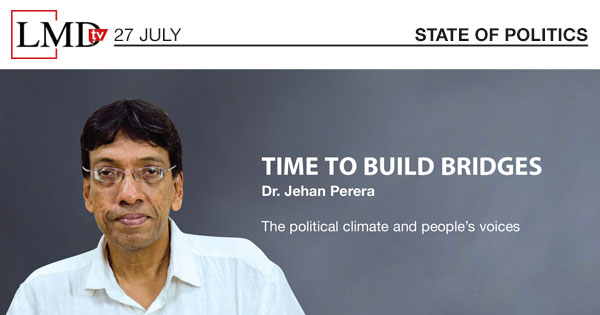LMD TV
Executive Director of the National Peace Council of Sri Lanka (NPC) Dr. Jehan Perera is of the opinion that “among the business sector, there is some positive anticipation about the new president. With his experience, intellectual knowledge and international connections, that he will bring about some measure of order and help resolve these problems.”
However, it is his perspective that the general population is sceptical. “The large mass of people is less optimistic because they see the long lines continuing; the lines appear to have grown longer since the new president took office, and price increases continue,” he said at the time of the interview.
“You can say it was a kind of revolution because through largely peaceful means, a president had to flee the country. Both the prime minister and a cabinet minister announced their resignations,” said Perera, noting that it could be said that the protesters broke the rule of law in a limited way but that it was a time of revolt.
On the viability of conducting elections in the not too distant future, he commented that “the cost of not having elections can be much higher than the cost of having elections – the cost of violence, the cost of people rebelling, and the cost of people not accepting the decisions of the government and going on strike – can be much higher. So we need a government that people trust and will listen to.”
“My feeling is that if there are elections, those who stand for change, those who give a vision of a change and who in their lives have been seen as trustworthy will have an advantage. The likelihood is that they will be elected,” he asserted.
He also shared his view that there are trustworthy candidates among the 226 members of parliament, stating that “those who will be elected are the ones who show that they will be part of the change. The people want change. There’s no question about it… I’m not saying that one party will win but a new set of people will be elected by and large at this time.”
Remarking on the point of the need for greater constitutional accountability in the executive and legislative branches, the executive director of the National Peace Council said: “Politics is more than just defeating the other and holding onto power, and being very clever about holding onto power. It’s more than a game.”
“Politics is about the millions of people who are suffering; who are looking for leadership; who are looking for a better life. Therefore, accountability is very important,” Perera stressed.
When one accepts a position, it is a significant burden as one is obligated to deliver results. It is the notion of accountability. It is a responsibility. And if one fails to deliver, one must accept responsibility for one’s actions. There will need to be discipline. The nation requires improved systems of checks and balances to address the problem.
“I’m hopeful of our new president. He comes from a different party; he comes from a party with just one person in that parliament; he comes with a lot of experience. I’m hopeful that with his experience and intelligence, he will do something… we have to give him time,” he said.
Perera confessed that he hadn’t done much reading on the illegally obtained funds by corrupt politicians, and added: “Our country can take the lead for the world and challenge this. We should be able to argue with the international community – those countries that permit and encourage such ill-gotten wealth to be hidden in their countries. We must challenge them.”
“What we try to do is we try to build bridges between the communities because we think Sri Lanka is a multi-ethnic, multi-religious civil society. We are different; we think differently. And we prefer often to live in our own communities… So we try to build a platform from which people can come together and get to know each other,” Perera said in conclusion, speaking about the work of the National Peace Council.




